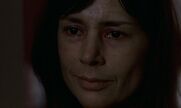After watching "Shouting and Whispering" , I began to like him. Although I was still tired, the way I was tired was different from what I imagined. In fact, his narration and his lens expression were not what I expected at first. It's so obscure, the plot is very clear, and the emotions are full. It's just a slow unfolding and requires some patience, but it can definitely make you see it clearly. Even at the end of the scene where you discuss how to deal with Anna, I think it's a bit too straightforward. . But he still felt tired because what he was thinking about was too painful and tangled.
It's about family relationships - the relationship between the three sisters has always been bad. When the eldest sister died, she hoped to fulfill her mother's wish so that the sisters could have a good relationship, but it couldn't be realized until she died and after she died. . In fact, it is better to say that it is the bloom of each of the three people's own problems.
As far as the little sister Maria is concerned, she is relatively kind, but in a sense, she can be regarded as a pornographic tendency. I don't know if it's appropriate to say that, even if her actions are not excessive in my moral view, but in the film's stern atmosphere, those actions are deeply offensive. Whether it was her sister being sick or seeing Anna's youngest daughter, her focus was not on the patient, but at the doctor she knew from the past, what she thought was not how to make the patient get better soon, but how to make the doctor stay. Spend more time with her. If it was just that, I would still think she was just a person influenced by personal feelings, but seeing the so-called reconciliation touch between her and the second sister, I dare to say that it is definitely beyond the scope of family affection. In fact, it is already full of The caress of desire, and her so-called kinship love, is also based on this. Aside from being swayed by lust, all she could do was a pretty cheap bit of mercy, whether it was for the eldest sister or Anna.
And the second child Carlin, from the angular face and the withered body after taking off her clothes, has already seen the projection of her character. Most of the time, she is an extremely rational person, so basically she is actually The head of the family is rational and even a little cold. But she is not such a simple machine, her rigid appearance is actually quite fragile, a hypocritical cheating husband, and a third sister that her rational and clean personality can't tolerate, make her even more Choose a kind of autism, and this kind of autism makes her feel lonely - no one wants to be bad to others, and when they are not good to others, she will definitely feel uncomfortable. The extreme behavior of stabbing her own lower body with the fragments of the wine glass can be regarded as a release of emotions, or it can be regarded as a kind of stress and a kind of self-protection for her - not letting those unclean things get close to her, psychologically. Cleanliness has reached its peak (I don't know if the fish hook in Kim Ki-duk's "Drifting Room" was inspired by this passage). She is always so contradictory, so "sometimes I hurt people, sometimes I'm sorry", and she herself has been split.
The maid Anna is the kindest character in the movie. She is the only one who really loves the sick eldest sister. Someone once wanted to explain this as a homosexual theme. Although I do not reject homosexuality, I think this kind of love does not include What kind of sex component can be regarded as a kind of maternal love. It can be seen from Anna praying for her little daughter that she released maternal love to the eldest sister at the same time. Therefore, the famous naked breast scene is actually full of Virgin Mary. At the same time, I think there is more of a mutual supportive feeling that only occurs between women. This cannot be called love, with a bit of love and tacit understanding between women.
As for the eldest sister, although she has a strong desire to love, her heavy body does not allow her to realize her desire, and when she leaves the body, all this is even more extravagant. In the scene of her returning to her soul after her death, Bergman handled it very coldly, without the slightest feeling of supernatural beings, and just thought it was a matter of course, but in such a scene, the eldest sister's fragility, and the other sisters' different thoughts are expressed very clearly.
Men are pretty weak. Maria's husband apparently heard his wife's cheating overtones and just silently killed himself (I don't know if that's really the reason, but since he's not the main character, I don't think it's more complicated Reason), suicide is a very contemptible behavior in religion, and the useless suicide has not succeeded-because of lack of courage, that moan is not so much life is difficult as it makes people see this man's humble and wretched. Carlin's husband is typically sanctimonious, and Bergman used a few scenes to show his hypocrisy and selfishness too clearly, even too starkly.
When it comes to this, I don't want to talk about it, because when I think of the ending, the sun is cruel, just like the red living room.
View more about Cries & Whispers reviews











